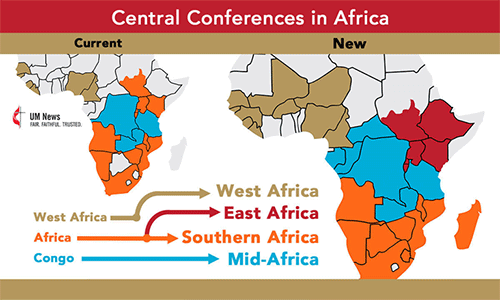United Methodists participated in a development not seen in almost 30 years: the addition of a central conference.
Central conferences are United Methodist regional bodies in Africa, Europe and the Philippines that typically meet every four years to elect bishops and adapt parts of the Book of Discipline, the denomination’s policy book, to their missional context. Each central conference consists of multiple annual conferences, which are the basic organizing body of The United Methodist Church.
Previously, the Germany Central Conference elected Bishop Werner Philipp; West Africa elected Bishops Ande Ikimun Emmanuel and James Boye-Caulker; and the Philippines re-elected Bishops Rodel M. Acdal, Ruby-Nell M. Estrella and Israel M. Painit.
Your support of the Episcopal Fund apportionment helps pay the salaries and benefits of United Methodist Bishops and allows them to travel across their episcopal areas providing mentorship and leadership.
Four central conference sessions are scheduled this year. By the time those meetings conclude in July, The United Methodist Church expects to have an additional eight new bishops and a whole new map.
The upcoming changes include increasing the number of central conferences from three to four on the African continent, resulting in a total of eight United Methodist central conferences around the world.
The increase will help strengthen United Methodist ministry on a continent where the denomination’s presence has long been growing, said North Katanga Area Bishop Mande Muyombo, president of the Africa Colleges of Bishops.

The last time The United Methodist Church formed a new central conference was in 1996, when General Conference — the denomination’s top legislative assembly — established what is now the Congo Central Conference, which also had previously been part of the Africa Central Conference.
Last year’s General Conference authorized the creation of the new central conferences as well as the addition of two new bishops on the African continent.
The number of African bishops will increase from 13 to 15, with a new episcopal area in East Africa and another in Mid-Africa.
It’s up to central conferences to determine the borders of their episcopal areas. But the legislation passed by General Conference recommends that the East Africa Central Conference create its new episcopal area in Burundi and the Mid-Africa Central Conference create its new episcopal area from parts of the North Katanga and South Congo episcopal areas.
Each central conference will be able to thrive in its own context, Muyombo said.
Ultimately, Muyombo and his fellow bishops hope that annual conference voters will ratify the package of amendments to the denomination’s constitution called regionalization. Under regionalization, the church in the U.S. and each central conference would become regional conferences with the same authority to adapt the Book of Discipline. To be ratified, constitutional amendments need the support of at least two-thirds of all annual conference voters around the globe.
Voting is taking place through October. The Council of Bishops expects to tally all votes and certify any amendment ratifications at its fall meeting in early November.
“It is our hope these central conferences will soon be regional conferences that will work towards their sustainability and make regional decisions that will strengthen mission and ministries in the respective annual conferences,” Muyombo said.
excerpt from a story by Heather Hahn, assistant news editor for UM News
One of seven apportioned giving opportunities of The United Methodist Church, the Episcopal Fund pays for bishops’ salaries, office and travel expenses, and pension and health-benefit coverage. Please encourage your leaders and congregations to support the Episcopal Fund apportionment at 100 percent.





